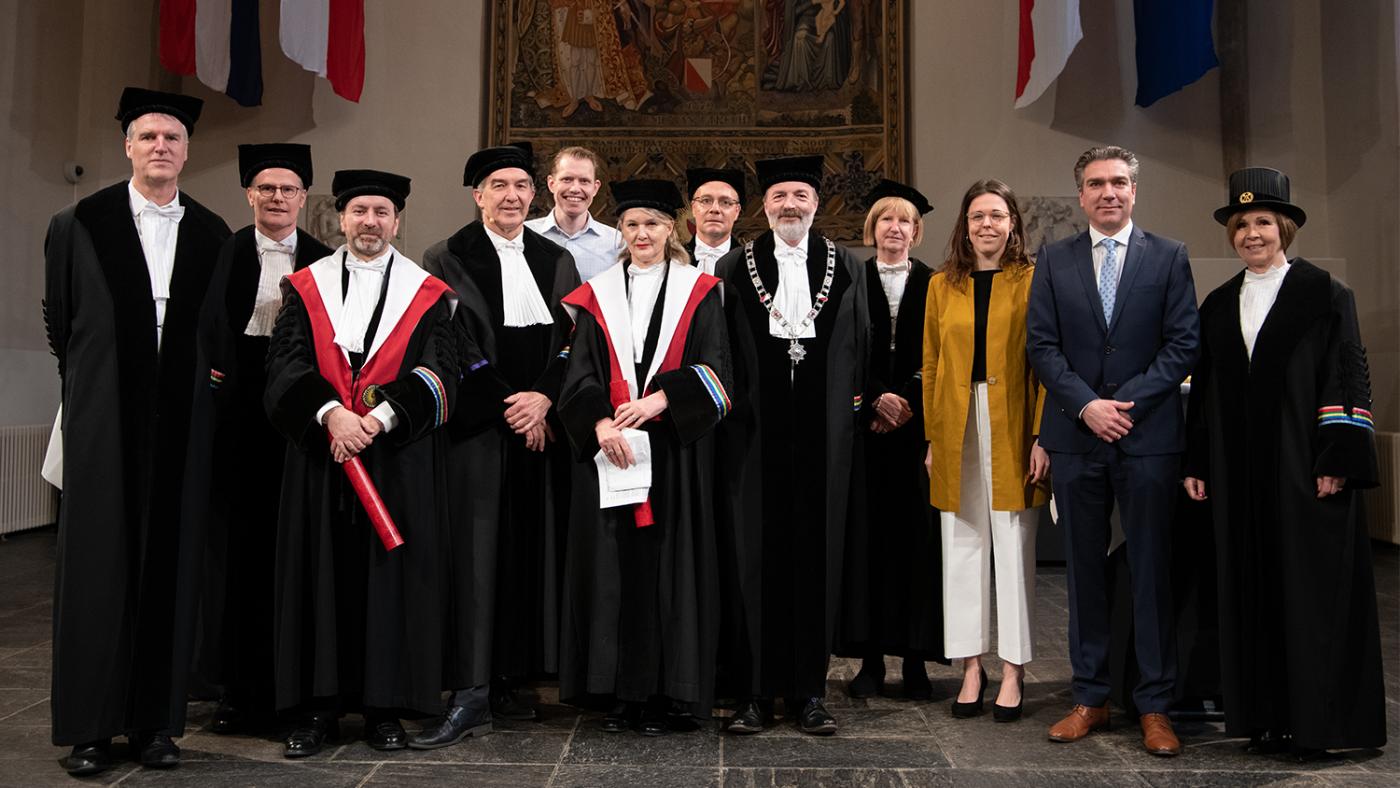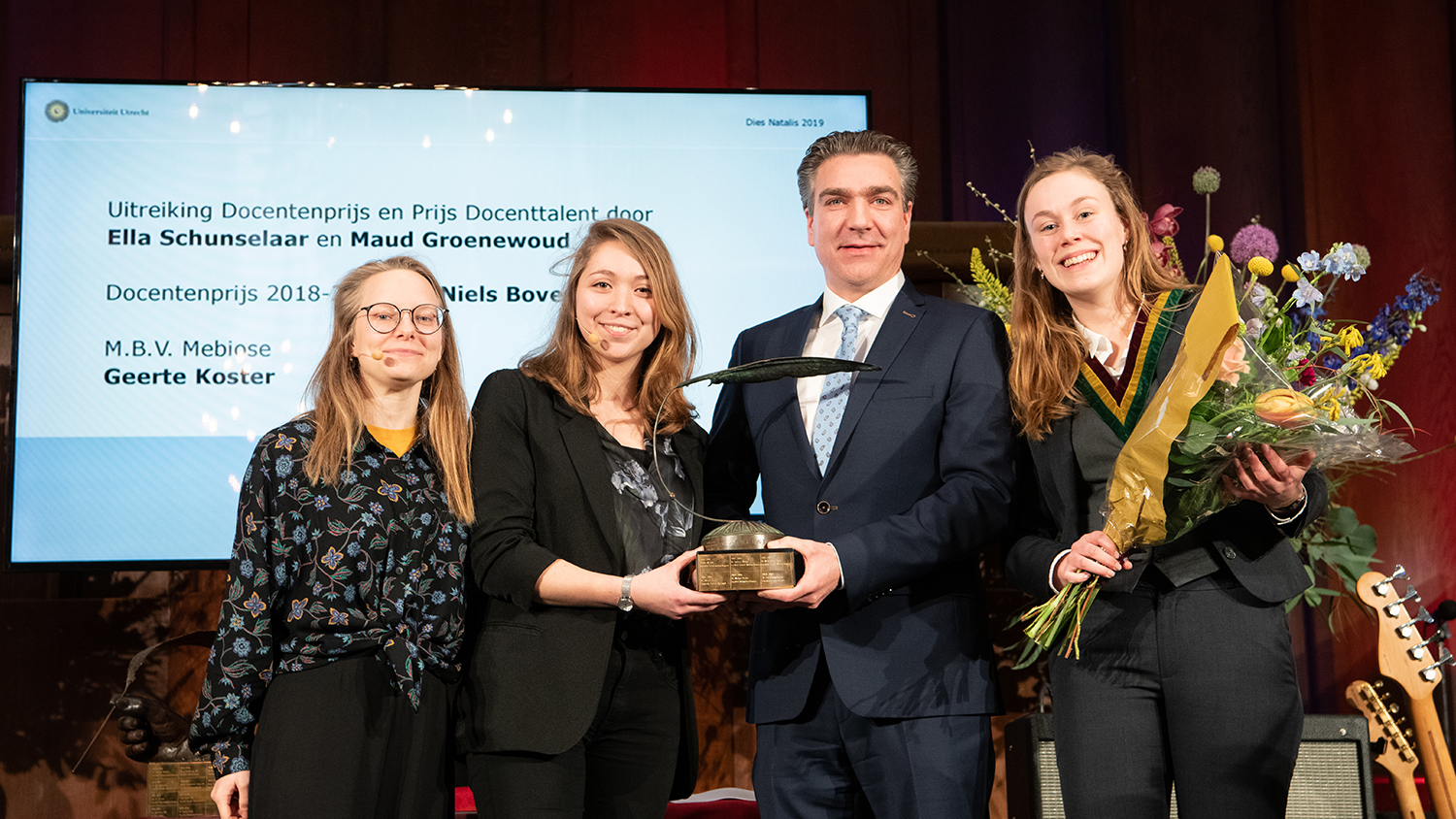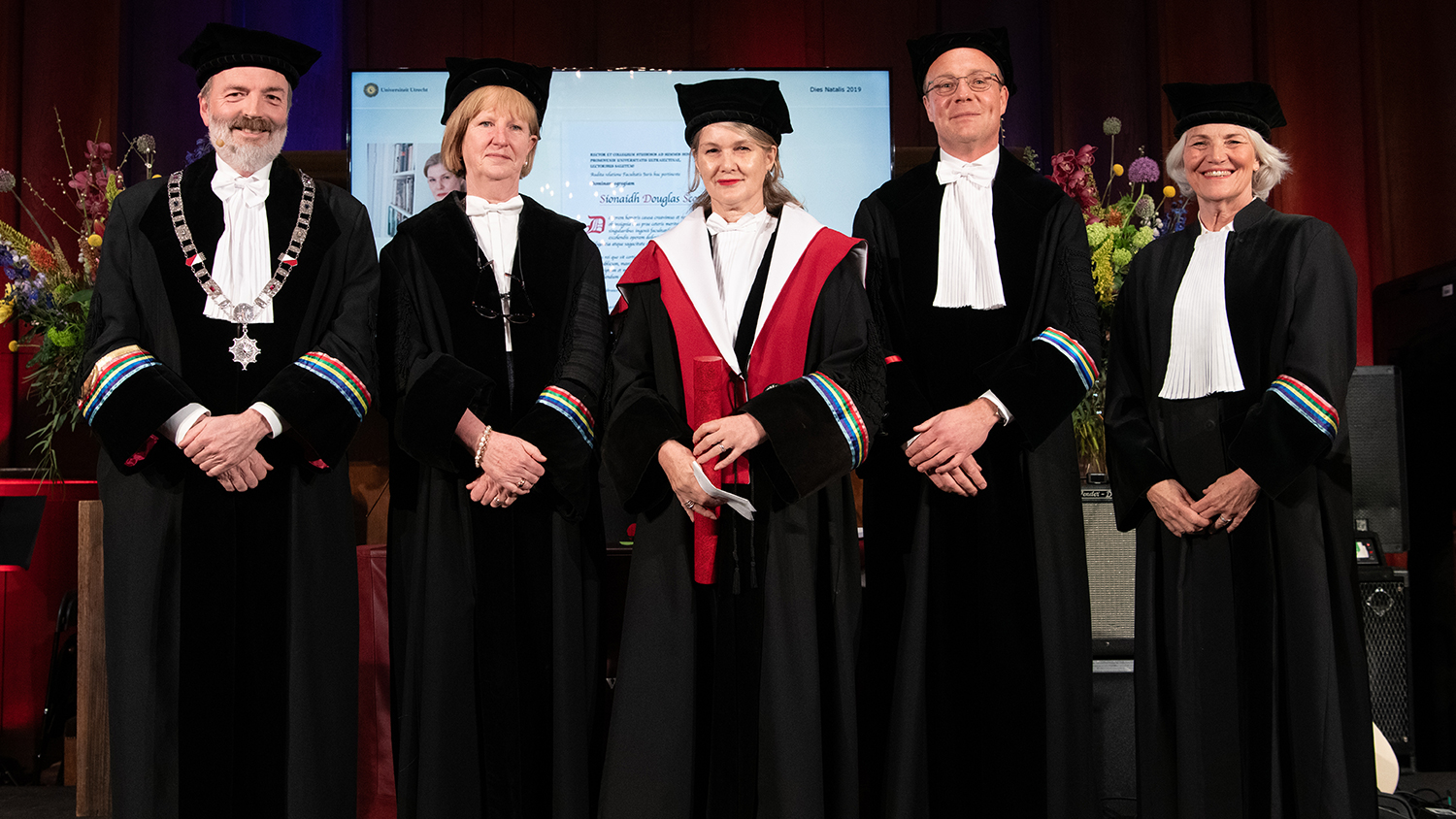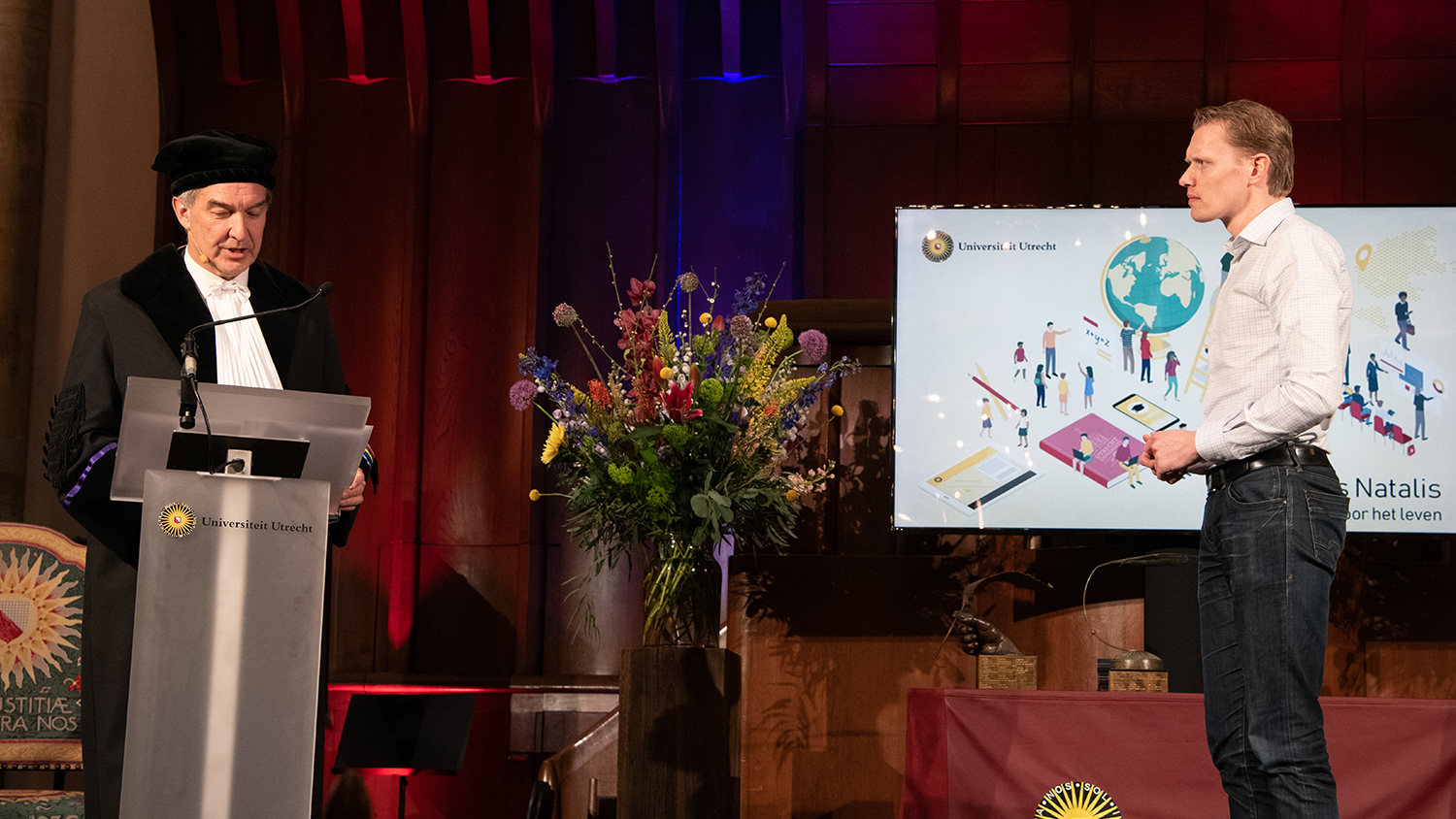Alumnus of the year steals the show at UU birthday bash

The ceremony in the Dom church started with a statement by chairman of the UU Executive Board Anton Pijpers. He referred to last week’s dramatic events. The shooting, and the impact it had even at the university. But he also referred to the teacher who made the news with his remark about Thierry Baudet and his Forum voor Democratie party. “An unacceptable remark, for which there’ll be fitting measures,” he said. Especially at a university, open debates should always be possible, and people should be open to other people’s points of view.
LifeLong learning
Rector Henk Kummeling took over from Pijpers with a plea for education. He emphasised that it’s a misunderstanding that research at university is deemed more important than education. That’s why the UU is working on career options for education professors. “As long as there’s interconnectedness between education and research,” he added.
The link to the theme of the day was that learning doesn’t end after graduation. “It should be our ambition that we don’t just equip our students for their first jobs, but also for their sixth.” And that means the university should pay more attention to learning after one’s college days. People at the VSNU are currently working on this, and the UU has a programme called LifeLong Learning.
Kummeling also had a message to teachers regarding the tasks that result from the lifelong learning programme: “This isn’t something to do on the side, but is a regular part of a teacher’s tasks.”
What that lifelong learning may look like, was exactly the theme of the Dies lecture by Finnish professor Sari Lindblom, professor of psychology of learning at University of Helsinki. She skipped the birthday of her own university, which is four years younger than the UU, to be at the UU. The picture she painted was unsurprising. Universities should keep learning, and think carefully about the way they can best reach their students, and they should also think about innovation and technology.
Requirements for teachers
The message that can be distilled from her story is that the requirements teachers have to meet will increase. And all that should fit within teachers’ regular set of tasks. With that, it was time to honour teachers and hand out the teaching awards. This programme element was handled by the students of the jury for the teacher of the year election.

The 2019 Lecturer Award went to biochemist Niels Bovenschen, head of the Pathological Research Laboratory. Students from study association Mebiose explained how Bovenschen inspires them, especially because he really knows how to involve his students in the relevant, recent research. As students, you feel like you’re really doing something useful and important.
The award for the Teacher Talent went to Public Governance and Management teacher Marij Swinkels. The students from study association Perikles spoke about the activating, creative way Swinkels captures their attention.
Honorary doctorates
This time, two honorary doctorates were awarded. The first went to Sionaidh Douglass Scott from Scotland. She first studied philosophy and art history, and then graduated from a Law programme. From 2015 to 2018, she was co-director of the Centre for Law & Society in a Global Context at Queen Mary University of London. Before that, she was attached to Kings College London and Oxford University as professor. Her honorary supervisor Sybe de Vries praised her research on human rights. She herself emphasised how unhappy she was about the approaching Brexit. In her eyes, it’s incomprehensible the Brits wish to leave the EU, given the (historical) ties to the continent. “I hope my students will still be able to study in Utrecht in the future.”
 The other honorary doctorate went to Andrés Rodriguez-Posé from the London School of Economics. He studied economic geography and social politics. From 2015 to 2017, he was the chairman of the international Regional Science Association. His research is on the intersection between science and society, which means he’s often asked to advise organisations such as the European Commission, the Organisation for Economic Cooperation and Development, and the World Bank. He studies, among other things, the question of which strategies work in crises and which don’t, and honorary supervisor Ron Boschman says his research ties in very well with the UU research in the strategic theme of Institutions for Open Societies. Rodriguez-Posé linked back to the day’s theme by saying there should be more attention to lifelong learning in societies. “Not just for individuals, but also to create a more innovative, dynamic society that’s better at adjusting to circumstances.”
The other honorary doctorate went to Andrés Rodriguez-Posé from the London School of Economics. He studied economic geography and social politics. From 2015 to 2017, he was the chairman of the international Regional Science Association. His research is on the intersection between science and society, which means he’s often asked to advise organisations such as the European Commission, the Organisation for Economic Cooperation and Development, and the World Bank. He studies, among other things, the question of which strategies work in crises and which don’t, and honorary supervisor Ron Boschman says his research ties in very well with the UU research in the strategic theme of Institutions for Open Societies. Rodriguez-Posé linked back to the day’s theme by saying there should be more attention to lifelong learning in societies. “Not just for individuals, but also to create a more innovative, dynamic society that’s better at adjusting to circumstances.”
Study delays
The musical intermezzo, provided by the Utrechtsche Studenten Bigband, already offered some necessary liveliness. But after that, comedian and mathematician Jan Beuving was the one who truly had the audience at the edge of their seats. He also touched upon the theme of lifelong learning. “With my nine years of studying, I understand they thought of me this year when they were looking for someone to be named alumnus of the year.” Beuving was funny and substantive at the same time. He jokingly referred to the Owl of Minerva which in his case had crashed against the window multiple times, and received applause when he stated universities should not neglect the Dutch language.
For dessert, chairman Anton Pijpers called the founders of the InclUUsion project to the stage. In this project, refugees are granted the possibility to study at the UU. For this extraordinary interpretation of ‘Lifelong learning’, the founders of the initiative, Marij Swinkels, Hilke Grootelaar, and Elena Valbusa, received the university’s Silver Medals.
The rector had the last word. He announced he’d like to see a modern version of the Io Vivat song. A singalong hit, he said. A song that reflects the modern-day university’s values. He ended his speech by calling for everyone to once more all sing along to… the Io Vivat.